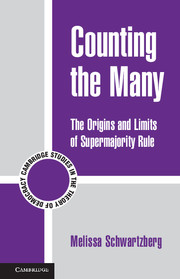Book contents
- Frontmatter
- Dedication
- Contents
- Acknowledgments
- 1 Introduction
- Part I A Remedy for the Problems of Unanimity
- Part II A Remedy for the Problems of Majority Rule
- 5 Equality, Majority Rule, and Supermajorities
- 6 Constitutionalism without Supermajorities
- 7 Constitutionalism under Complex Majoritarianism
- 8 Conclusion
- References
- Index
7 - Constitutionalism under Complex Majoritarianism
Published online by Cambridge University Press: 05 June 2014
- Frontmatter
- Dedication
- Contents
- Acknowledgments
- 1 Introduction
- Part I A Remedy for the Problems of Unanimity
- Part II A Remedy for the Problems of Majority Rule
- 5 Equality, Majority Rule, and Supermajorities
- 6 Constitutionalism without Supermajorities
- 7 Constitutionalism under Complex Majoritarianism
- 8 Conclusion
- References
- Index
Summary
Allow me to recapitulate the major deficiencies of supermajority rule, drawing on the arguments of the two preceding chapters. First, supermajority rules bias decisions in favor of one set of judgments, typically those supportive of the status quo. In the context of constitutionalism, supermajority amendment thresholds mitigate risks associated with instability, but introduce the risk of entrenching bad norms that may reflect distributive inequalities and other injustices dating to the framing. Further, the institutional bias in favor of a minority’s judgment or interest is introduced on an arbitrary basis, because of the indeterminacy of the threshold choice, and when governing amendment, is only revisable with respect to these same arbitrary strictures. Second, supermajority rules ensure that proposed changes have support above a majority, but do so at the risk of ascribing possibly fictive consensus support to the status quo. Supermajority rules may also reflect a sort of category error, holding that the relevant conception of consensus support is aggregative – reflected by an arbitrarily large number of individuals in favor of an amendment – rather than the sentiment of the community as a whole via the acclamatory or deliberative conception of consensus. Third, the minority granted a veto over the majority through supermajority threshold is at least as likely to be powerful as vulnerable, given the nature of constitutional decision making.
Recall from the opening pages of this book the hypothetical example of a gay couple in California, deprived of their right to marry by a swift majority vote. This example, among countless possible others, gives us reason to hesitate before advocating that barriers to constitutional amendment be swept away, replaced by simple majority referendums or legislative decisions. The perils of partisan and passionate majorities are clear. Yet the alternative to supermajoritarian constitutionalism is not pure populism. A set of institutional arrangements that I have termed complex majoritarianism can replace supermajority rule. Under complex majoritarianism, constitutional stability will be preserved for the right reasons. Decisions rooted in public deliberation, and subject to time delays, capture the desire to ensure that constitutional changes are not merely partisan or whimsical. Deliberative assemblies, optimally, will be sufficient to ensure that minorities are not the objects of tyrannical behavior; at a minimum, such assemblies will enable minority voices to be heard.
- Type
- Chapter
- Information
- Counting the ManyThe Origins and Limits of Supermajority Rule, pp. 182 - 204Publisher: Cambridge University PressPrint publication year: 2013



